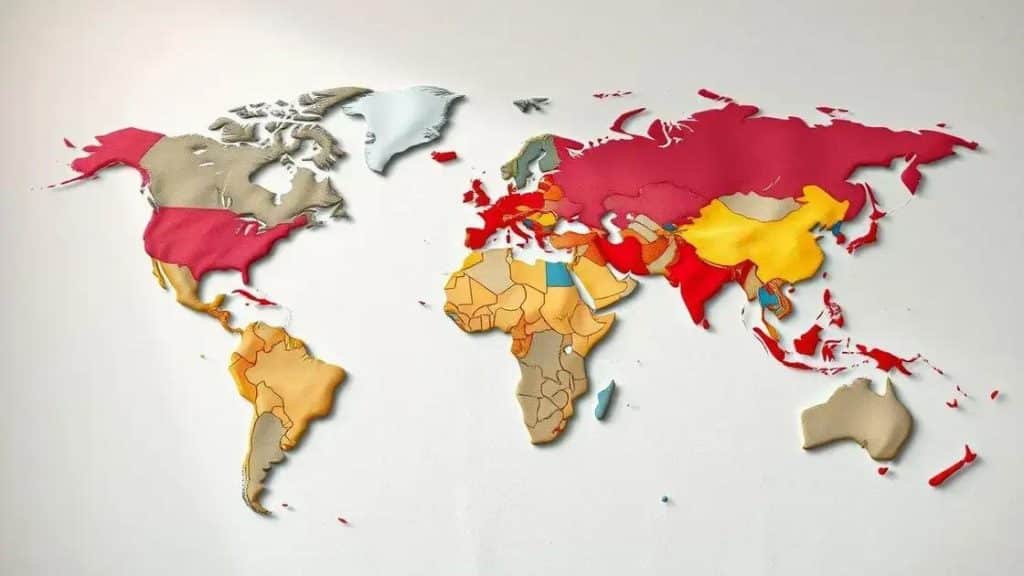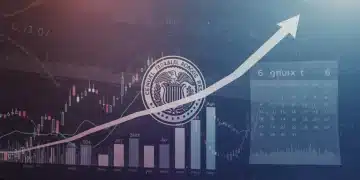Updates on global political stability: what you need to know

Updates on global political stability indicate that factors such as economic conditions, technological advancements, and the rise of multilateralism are shaping future governance and international relations.
Updates on global political stability are essential for understanding how shifts in government influence our lives. Curious about how these changes affect you? Let’s dive in.
Current trends in international relations
Understanding the current trends in international relations helps us grasp the complex dynamics affecting global stability. As countries interact more than ever, shifts in alliances and policies can have immediate and far-reaching consequences.
Shifts in Global Power
One prominent trend is the shift in global power dynamics. Emerging economies are gaining influence, challenging traditional powers. This can lead to new alliances and potential conflicts.
- China’s growing economic presence
- The impact of India on regional politics
- Russia’s geopolitical strategies
- Shifts in the European Union’s role
Another important aspect is the rise of nationalism. Countries are prioritizing their interests, often leading to tense relations with neighbors. This can undermine efforts for broader cooperation.
The Role of Technology
Technology is also playing a key role in shaping international relations. Cybersecurity and information warfare are now pivotal in diplomatic strategies. Nations are adapting to new threats posed by cyber attacks and misinformation.
- Cybersecurity as a national priority
- The influence of social media on public opinion
- Challenges in international cybersecurity cooperation
Moreover, international trade agreements are evolving. Trade tensions can arise quickly, affecting the stability of international markets. Countries are reconsidering trade partnerships, often leading to tariffs and economic disputes.
Multilateral Organizations
Multilateral organizations, like the United Nations, continue to face challenges in maintaining peace and security. Global crises, such as pandemics and climate change, require coordinated action, yet political will can falter.
As these trends continue to develop, staying informed is crucial. By understanding the current trends in international relations, individuals and businesses can better navigate the complexities of the global landscape. This knowledge can empower them to adapt to changes and seize opportunities as they arise.
The impact of economic factors on political stability
The impact of economic factors on political stability is significant and often intertwined. Economic conditions can create a foundation for peace or fuel unrest, depending on how they are managed within a country.
Economic Growth and Stability
When economies grow, they can support political stability. A strong labor market and rising incomes typically lead to higher public satisfaction. This lessens the risk of conflict and instability.
- Increased job opportunities
- Improved public services
- Strengthened government legitimacy
- Higher consumer confidence
Conversely, economic downturns can lead to dissatisfaction among the populace. When people struggle with unemployment and rising costs, they may turn to protests or unrest as a means of expressing their grievances.
Wealth Distribution
Another vital aspect is wealth distribution. A highly unequal distribution can sow seeds of discord. When wealth concentrates in the hands of a few, many feel excluded from opportunities. This sense of injustice can destabilize political situations, leading to protests or calls for reform.
- Effects of income inequality
- Access to resources and opportunities
- Role of the middle class in stability
Trade policies also play a role in shaping political landscapes. Countries reliant on specific exports can become vulnerable to global market changes. Shifts in demand can lead to economic crises, impacting political stability.
Global Economic Relationships
Finally, global economic relationships affect domestic stability. International trade agreements and partnerships can bolster economic growth, but they can cause friction as well. Nations may face tough decisions about aligning with certain trade partners or risking potential economic fallout.
Understanding the impact of economic factors on political stability is crucial for individuals and policymakers alike. By recognizing these dynamics, they can better prepare for and respond to challenges in the global landscape.
Regional conflicts and their global implications

Regional conflicts have significant global implications. These conflicts often stem from historical grievances, competition for resources, or political power struggles. Understanding these dynamics is essential for grasping their impact on international relations.
Causes of Regional Conflicts
Many regional conflicts arise due to a mix of cultural, economic, and political factors. Ethnic tensions and competition for limited resources can lead to clashes that disrupt stability.
- Ethnic and religious divides
- Struggles over land and natural resources
- Pursuit of political power
- Influence of foreign nations
Economic instability often exacerbates these tensions, leading to violence and unrest. As countries grapple with the fallout, the repercussions can ripple across borders, affecting nearby nations and even the global community.
Global Reactions and Consequences
The international response to regional conflicts varies. Some conflicts draw significant global attention, leading to diplomatic interventions. Other situations may result in sanctions or military involvement, which can escalate tensions further.
- Humanitarian aid efforts
- Economic sanctions on aggressor nations
- Peacekeeping missions by international organizations
Additionally, regional conflicts can shift trade routes and disrupt global markets. For instance, conflicts in the Middle East can affect oil prices worldwide, highlighting the interconnected nature of today’s economies.
The Role of Media and Technology
Media coverage of regional conflicts also plays a crucial role. News reports can shape public opinion and influence government policies. The rise of social media allows for real-time updates, enabling people to engage with global issues like never before.
As regional conflicts continue to emerge, their global implications become more apparent. It is critical to watch these developments to understand how they may impact international relations and political stability on a broader scale.
Strategies for individuals to stay informed
Staying informed about global political stability is essential for individuals. By understanding current events, you can engage in meaningful conversations and make informed decisions. Here are some effective strategies for individuals to stay informed.
Utilize Reliable News Sources
Start by following trustworthy news outlets that provide accurate and balanced reporting. This ensures you get a well-rounded view of events from different perspectives. Make it a habit to check the news daily.
- Subscribe to reputable newspapers
- Follow respected news websites online
- Listen to trusted news podcasts
- Watch news channels with a solid reputation
In addition to mainstream media, consider exploring niche sources that focus on political analysis or international affairs. These can offer deeper insights into trends affecting global stability.
Engage with Social Media Wisely
Social media is a powerful tool for staying updated, but it’s important to use it wisely. Follow experts, journalists, and organizations that provide credible information. This way, you can filter out misinformation.
- Follow thought leaders on platforms like Twitter
- Join groups that discuss political topics on Facebook
- Use hashtags to find relevant discussions
Be cautious about sharing news until you’ve verified it. Misinformation can spread quickly, especially on social platforms.
Participate in Community Discussions
Engaging in community discussions can enhance your understanding. Attend town hall meetings, forums, or workshops focused on political issues. These gatherings provide opportunities to learn from others and express your views.
Moreover, consider joining local advocacy groups or organizations that focus on global issues. This way, you can connect with like-minded individuals while expanding your knowledge.
Making an effort to stay informed about global political dynamics is crucial. By implementing these strategies, you’ll be better equipped to understand the complexities of our world and engage with the issues that matter most.
Future predictions for global governance
Future predictions for global governance are increasingly complex as the world faces numerous challenges. As countries strive for stability and cooperation, the landscape of international relations is evolving.
The Rise of Multilateralism
One major trend is the rise of multilateralism. Countries are recognizing that many issues, like climate change and pandemics, require collective action. Through international organizations, nations can collaborate more effectively.
- Increased partnerships among countries
- Strengthening of organizations like the UN
- Global agreements on shared challenges
Multilateralism can enhance global stability by fostering cooperation. When countries work together, they can address conflicts and promote peace more effectively.
Technological Influence
Technology will also play a crucial role in shaping future governance. Innovations in communication and data analysis are changing how governments operate. Transparency and accountability can improve as information becomes more accessible to the public.
- Use of AI in decision-making
- Data sharing among nations
- Cybersecurity as a top priority
Moreover, social media will continue to empower individuals. People can now connect across borders, influencing governmental policies and holding leaders accountable.
Adapting to New Challenges
Future governance will need to adapt to emerging challenges. Economic disparities, migration crises, and environmental issues are pressing concerns that require innovative solutions. Governments may need to rethink traditional policies and adapt to changing demographics.
In addition, the balance of power may shift as emerging economies grow stronger. Nations like India and Brazil could take on more significant roles in global governance, impacting existing structures.
As we look ahead, understanding these future predictions for global governance is vital. Staying informed will help individuals and policymakers navigate the complexities of an interconnected world.
FAQ – Frequently Asked Questions about Global Political Stability
Why is global political stability important?
Global political stability is crucial as it impacts international relations, economic growth, and security. When nations are stable, there is less conflict and more opportunities for collaboration.
What are the main factors influencing political stability?
Main factors include economic conditions, social equity, governance, and the ability to manage conflicts. A balance among these elements is essential for maintaining stability.
How can technology impact global governance?
Technology enhances transparency and efficiency in governance. It allows for better communication and data sharing, leading to more informed and responsive political decisions.
What role do individuals play in promoting political stability?
Individuals can stay informed, participate in discussions, and advocate for responsible governance. Engaging in community actions helps to foster a more stable and democratic environment.





